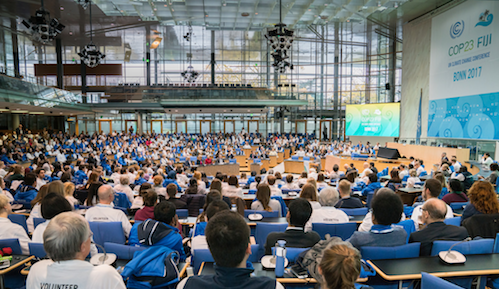
The 23nd session of the UN Climate Change Conference, held in Bonn and presided over by Fiji (the first among Small Island Developing States to lead a UNFCCC Conference of the Parties). Its major objective was the implementation of the Paris Agreement through the preparation of a “Rule Book” to be adopted at COP24 on December 2018, in Poland. CMCC Foundation’s researchers Lucia Perugini and Eleonora Cogo, who took part in COP23 as members of the Italian delegation, illustrated and commented on its main outcomes during CMCC’s seminar: “COP 23: dopo Bonn, a che punto sono i negoziati sul clima” (“COP23: after Bonn, where are we with climate negotiations?”).
Within the EU negotiating team, Lucia Perugini (CMCC, IAFES Division) is the co-chair of the expert group on “Agriculture, forests and other land uses”, while Eleonora Cogo (CMCC, CSP Division) is co-chair of the expert group on “Adaptation”.
Watch the video:
COP23 was a very technical conference, mainly focused on rules and processes, but also the first since Trump’s announcement to withdraw from the Paris Agreement. The differentiation between developing and developed counties, the balance in relation to mitigation, adaptation and finance, pre-2020 actions, the Adaptation Fund and other financial issues were some of the most controversial matters discussed during these climate negotiations.
The main outcome of the Conference is “Fiji Momentum for Implementation”, a document that aims to advance guidelines on the implementation of the Paris Agreement.
In particular, it is built around three main pillars: actions for the completion of the work programme under the Paris Agreement; the design of the 2018 facilitative dialogue, known as the Talanoa dialogue because of its Fijian approach; actions for the pre-2020 implementation and ambition.
“Talanoa” is a traditional word used in Fiji and the Pacific to reflect a process of inclusive, participatory and transparent dialogue. The purpose of the Talanoa Dialogue is to enhance ambition and inform the preparation of the Nationally Determined Contributions (NDC).
It will be structured around three general topics: “Where are we?”; “Where do we want to go? “How do we get there?” Moreover, the dialogue will consist of a preparatory and a political phase, the latter to be held during COP24, where high-level state representatives will undertake political discussion to take stock of the collective advancement toward the Paris objectives. It will also consider Parties efforts during the pre-2020 period. Inputs to the dialogue will be: the IPCC Special Report on 1.5°C; analytical and policy relevant inputs submitted by Parties, stakeholders and expert institutions by April 2, 2018 (technical phase) and October, 2018 (political phase); and contributions from both COP23 and COP24 Presidencies.
To facilitate access to all inputs to the dialogue, an online platform will be built and managed by the UNFCCC secretariat, which is also requested to prepare relevant inputs.
By launching next steps on action prior to 2020, the most relevant provisions included in the final document on this matter are the request to the UNFCCC and the UN Secretary General to enhance activities to promote the ratification of the Doha Amendment, which established the second commitment period of the Kyoto Protocol, inviting parties to submit information on progress that will serve as input for a stocktake of pre-2020 actions both in 2018 at COP24 in Katowice, Poland, and in 2019 at COP25.
Another main outcome of COP23 was the text on agriculture (Koronivia Joint Work on Agriculture) which represents a compromise between developing countries’ adaptation priorities and the need to include mitigation issues requested by developed countries. The topics related to agriculture that the work will need to address are: adaptation, soil fertility, water management and improvement of livestock management systems, etc.
Moreover, a compromise on Loss & Damage was reached with the establishment of an “expert dialogue” that in 2018 will explore information, inputs and views on ways for facilitating the mobilization of financial support to address L&D.
Among the main initiatives related to this topic and launched at COP23 are the InsuResilience Global Partnership, a partnership to strengthen the resilience of developing countries and protect the lives and livelihoods of poor and vulnerable people against the impacts of disasters, and the Fiji Clearing House for Risk Transfer that serves as a repository for information on insurance and risk transfer.
Italy launched the Fellowship Programme for Climate Vulnerable Countries aimed at strengthening the institutional capacity of the Small Island Developing States (SIDS) and the Least Developed Countries (LDCs). Canada and the UK launched the Powering Past Coal Alliance to accelerate clean growth and climate protection through the rapid phase-out of traditional coal power.
In addition, the Local Communities and Indigenous Peoples Platform became operational at COP23 to strengthen knowledge, technologies, practices and efforts on climate change, therefore allowing them to take part in the UNFCCC process. Also, the Gender Action Plan (GAP) containing priority areas was established to advance full and equal women’s participation and promote gender-responsive climate policy.
Finally, one of the most successful outcomes of the COP was the huge involvement of non-state actors, whose engagement on climate change issues shows an increasing trend.
For further information:
- The launch of the initiative “InsuResilience Global Partnership” to enhance financial protection against climate risks.
- The “Fellowship Programme for Climate Vulnerable Countries”, an initiative launched by Italy aimed at strengthening the institutional capacity of the Small Island Developing States (SIDS) and the Least Developed Countries (LDCs) to respond to the challenges arising from climate change.
- The “Powering Past Coal Alliance”, an initiative launched by Canada and UK.
- The UN Platform for Indigenous and Local Community Climate Action that became operational at COP23.


